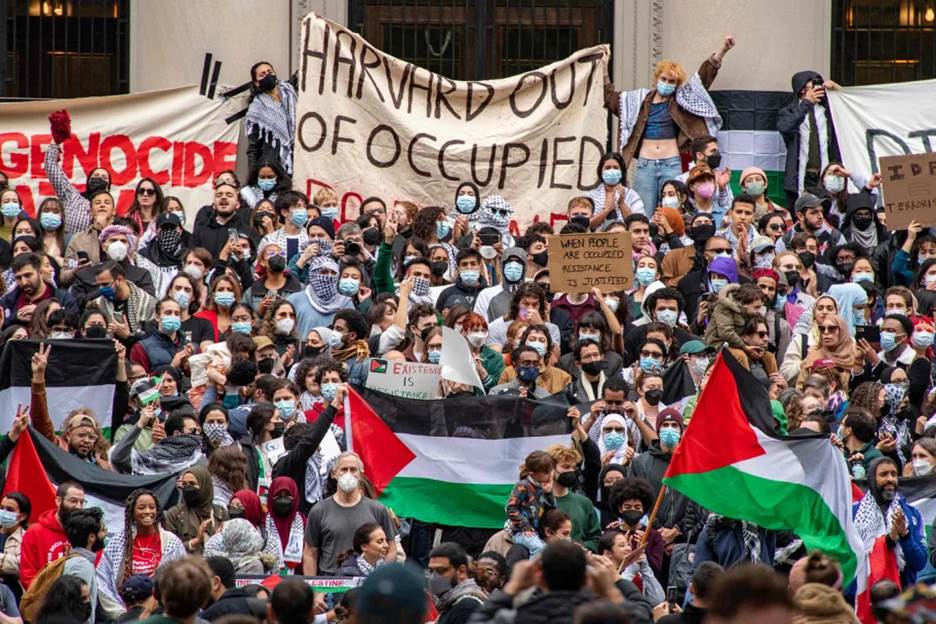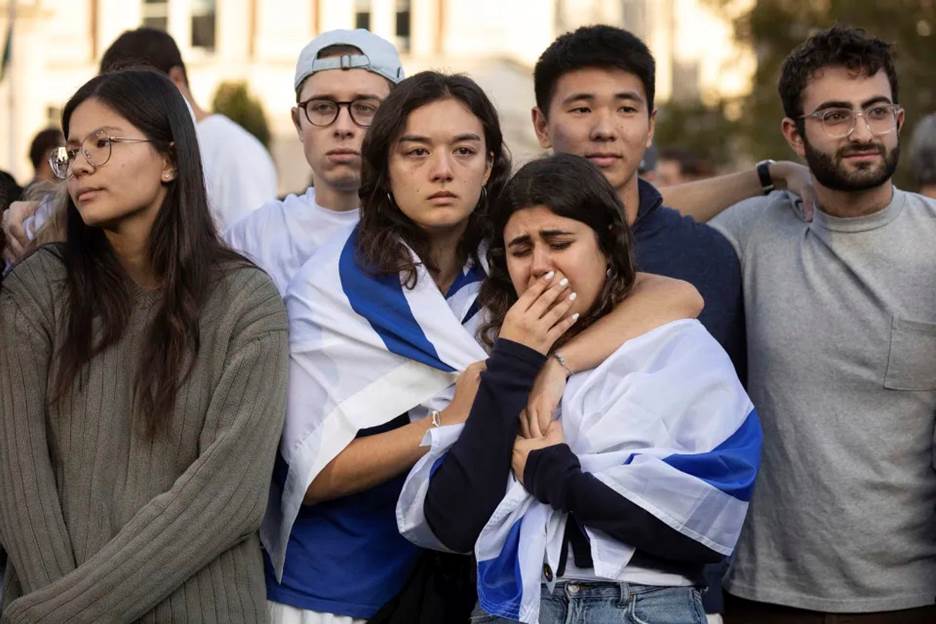Israel-Hamas War Continues to Roil American Colleges, Sparking Walkouts
By Daniel Arkin and Kat Tenbarge and Huiling Zhou
Dozens of US colleges and universities are increasingly riven by tensions over the war between Israel and Hamas , offering a window into how a rising generation perceives the conflict in the Middle East and the US government’s foreign policy in the region.
In recent days, protests and demonstrations have broken out on several campuses, in some cases drawing national attention and putting intense scrutiny on young people that some observers consider unfair. In some situations, student activism around the war has overlapped with volatile debates about free speech.
George Washington University came under the spotlight Tuesday after students affiliated with the group Students for Justice in Palestine projected slogans critical of the Israeli government on the wall of a library, including “Divestment From Zionist Genocide Now.” The images circulated widely on X, the platform formerly known as Twitter.
The conflict between the Israeli government and the Palestinian people has long been the subject of intense debate in the US, especially on college campuses, where political activism is common. But the new war has raised the temperature dramatically, giving rise to social environments on campus that mirror the country’s similarly polarized politics.
Students at more than 100 colleges and universities from coast to coast planned walkouts in support of the Palestinian people on Wednesday afternoon, according to various posts on Instagram and X.

Protesters at Harvard University show their support for Palestinians in Gaza at a rally in Cambridge, Mass., on Oct 14, 2023 - Joseph Presiozo / AFP - Getty Images
The tensions have flared at some elite institutions, including Ivy League universities on the East Coast. Columbia University on Tuesday postponed a major fundraising drive amid intense debates on campus, where hundreds of people massed for competing pro-Israel and pro-Palestinian demonstrations after the Hamas attack.
In an interview, the student leader of a pro-Palestinian group at Columbia said their personal information had been published online and they had been harassed over their activism, adding that the “atmosphere on campus”

Pro-Israel demonstrators react while singing a song during a protest at Columbia University on Oct 12, 2023, in New York (Yuki Iwamura / AP)
has not been conducive to open and robust geopolitical debate.
“If you cannot speak freely or engage in intellectual curiosity on a university campus, then the university has failed its students,” said the student, who spoke on the condition of anonymity.
Leaders at Harvard University and the University of Pennsylvania have been sharply criticized by top donors for how they responded to the Oct 7 assault and the fallout on their campuses. The terror attack in Israel killed 1,400 people. Israel’s counteroffensive in Gaza has killed more than 6,500 people, according to the Palestinian Health Ministry.
However, some campuses have managed to come together in grief. Brown University students and community members, for instance, assembled last week to light candles and recite both Jewish and Muslim prayers as a form of tribute to the people who have been killed in Israel and Gaza, according to student newspaper coverage .
Florida Gov Ron DeSantis, who is seeking the Republican presidential nomination, on Tuesday ordered two state universities to deactivate chapters of Students for Justice in Palestine because they purportedly violated state laws barring antisemitism, according to the governor’s office.
DeSantis’ office claimed that the groups distributed a “toolkit” containing language that it said would “promote discriminatory and violent behavior towards Israelis or Jews and promote supporting terrorist organizations.” The National Students for Justice in Palestine did not immediately respond to a message requesting comment on DeSantis’ actions.
The media offices for the University of Florida and the University of South Florida, the two schools named by DeSantis’ office, did not immediately respond to emails requesting comment.
The war has also stoked renewed fears about antisemitism and Islamophobia in the US. In recent weeks, Jewish and Muslim people across the country have expressed concern about the potential for hate crimes or other violence against their communities.
Jacob Miller, 21, a mathematics major at Harvard University, said he and other Jewish students have “seen hateful posts on social media that echo age-old antisemitic tropes, including a reference to Jewish control of the media” — a conspiracy theory often deployed by white supremacists and neo-Nazis.
“The initial shock and grief of the first week has subsided, and yet tensions are still high because this is a very personal conflict for many,” said Miller, who is the president of the university’s chapter of the Jewish student organization Hillel. He said the rising campus tensions have “fundamentally reshaped the way I and fellow students conceive of this campus.”
“The end of this conflict won’t change what has happened over the last several weeks,” he said.
The recent public opinion polling paints a complicated portrait of how young people feel about the war and the US government’s immediate response.
In a Quinnipiac poll published last Tuesday , registered voters between the ages of 18 and 34 said they disapproved of the US sending weapons and military equipment to Israel in response to the Hamas attack by a margin of 51% to 39%, and just 21% of voters in that age group said they approved of President Joe Biden’s handling of the nation’s policy toward Israel.
When asked whether their “sympathies” rested more with the Israelis or Palestinians, 41% of registered voters between 18 and 34 said the Israelis, 26% said the Palestinians, and 33% replied that they don’t know or didn’t answer the question.
Meanwhile, a Generation Lab poll released the same day found that a majority of American college students blamed Hamas for the Oct 7 assault on Israel, while two-thirds described the attack as an act of terrorism by Hamas.
This article was originally published on NBCNews.com

